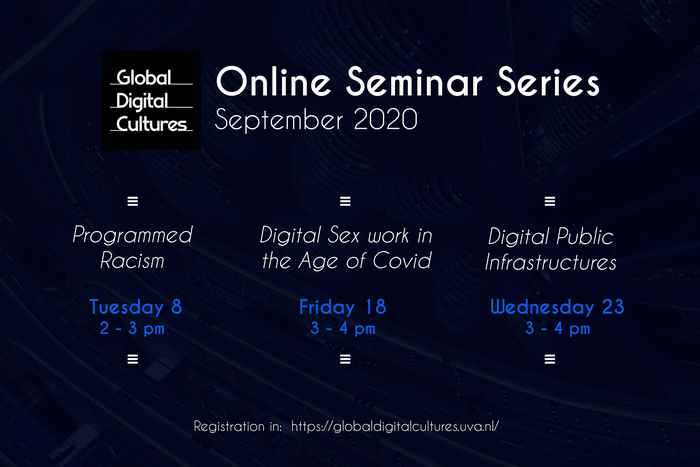GDC Webinar Series 2020
All invited!
1 September 2020

Programmed Racism
September 8, 2020, 14:00 -15:00
How do digital technologies mediate racism? It is increasingly clear that digital technologies, including auto-complete function, facial recognition, and profiling tools are not neutral but racialized in specific ways. This webinar focuses on the different modes of programmed racism. We present historical and contemporary examples of racial bias in computational systems and learn about the potential of Civic AI. We discuss the need for a global perspective and postcolonial approaches to computation and discrimination. What research agenda is needed to address current problems and inequalities?
Chair:
Lonneke van der Velden, University of Amsterdam
Speakers:
- Sennay Ghebreab, Associate Professor of Informatics, University of Amsterdam and Scientific Director of the Civic AI Lab, for civic-centered and community minded design, development and development of AI
- Linnet Taylor, Associate Professor at the Tilburg Institute for Law, Technology, and Society (TILT), PI of the ERC-funded Global Data Justice Project.
- Payal Arora, Professor and Chair in Technology, Values, and Global Media Cultures at the Erasmus School of Philosophy, Erasmus University Rotterdam and Author of the ‘Next Billion Users’ with Harvard Press.
Digital Sex work in the Age of Covid
September 18, 2020, 15:00-16:00
Digitization is transforming the global sex industry. With their low barrier of entry, live and highly interactive character, webcam sex platforms such as Chaturbate or LiveJasmin have become one of the sex industry’s most profitable and fastest growing segments. This development has been further propelled by Corona, which forced many sex workers to look for alternative sources of income online. But what does their work entail? Which new risks and opportunities do they encounter, compared to offline sex work? Does ‘camming’ lead to a new global proletariat of sex workers? Or can it provide new forms of empowerment?
Chair:
Olav Velthuis, Professor of Sociology, University of Amsterdam
Speakers:
- Angela Jones, Associate Professor of Sociology at Farmingdale State College, State University of New York and author of the book Camming: Money, Power, and Pleasure in the Sex Work Industry.
- Yvette Luhrs, Sex worker and activist for sex workers’ rights.
- Zaïre Krieger, Spoken Word Artist, BA International & European Law, Journalist.
Digital Public Infrastructures
September 23, 2020, 15:00-16:00.
Public institutions, from universities and museums to public service media and local governments, are rapidly becoming digitized. In this process, they increasingly depend on digital platforms, operated by major corporations, most prominently Google, Amazon, Facebook, Apple, and Microsoft. Consequently, public institutions have limited control over how key services are developed and how data is collected and processed through these services. The Covid-19 crisis, which further accelerates digitization, has made this particular urgent. This webinar discusses whether there is a need for digital public infrastructures. Which digital public services are needed and how should these be developed? What resources are needed to make public digital services successful?
Chair:
Thomas Poell, Professor of Data, Culture & Institutions, University of Amsterdam
Speakers:
- Jack Linchuan Qiu, Professor at the National University of Singapore and author of Goodbye iSlave
- Seda Gürses, Associate Professor at TU Delft, she works among others on software infrastructures, social justice and political economy.
- Geert-Jan Boogaerts, Head Digital Media @VPRO, and Initiator of PublicSpaces (https://publicspaces.net/)